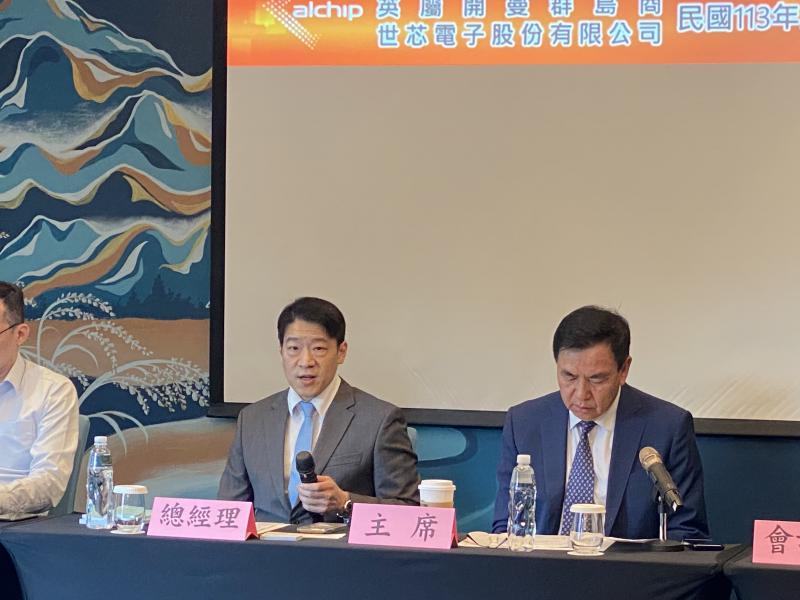Alchip Technologies Ltd (世芯), an application-specific integrated circuit (ASIC) designer specializing in artificial intelligence (AI) chips, said it is highly confident that revenue would grow 30 percent annually next year, although a key customer’s demand for existing chips are to falter due to a product transition.
The stock price of Alchip has plummeted more than 35 percent to NT$3,120 yesterday, a few months after seeing the peak of NT$4,430 in February.
Investors had turned bearish in fear that Alchip might lose growth momentum, as its biggest customer, Amazon.com Inc, would adopt a new chip next year or maybe even give up using ASICs completely.

Photo: Vanessa Cho, Taipei Times
The stock price decline was, to some extent, buoyed by Amazon.com’s NT$535 million (US$16.5 million) equity investment in Alchip via a share subscription last month.
“I have set a minimal growth target of 30 percent year-over-year each year,” Alchip CEO Johnny Shen (沈翔霖) told reporters on Thursday on the sidelines of the company’s annual shareholders’ meeting in Taipei.
“I am confident we can reach that [growth] figure next year…. We are striving to sustain existing customer accounts and to win new orders at the same time,” he said.
Shen said the company would regain strong revenue growth in 2026, after customers start adopting its new 3-nanometer and 2-nanometer AI chips.
Alchip last month said that the world’s major cloud service providers would continue developing their AI chips through ASIC service providers, given lower costs compared with Nvidia Corp’s AI chips.
Alchip would be a major beneficiary from the AI trend, given its engineering capabilities and its experience in bringing chips to mass production, the company told investors at the time.
Additionally, the technology barrier is getting higher, meaning fewer competitors are capable of developing chips using advanced 3-nanometer and 2-nanometer process technologies, Shen said.
Nvidia is reportedly considering tapping into the ASIC market, while smartphone chip designer MediaTek Inc (聯發科) has been trying to break into the ASIC market over the past few years by leveraging its intellectual property portfolios.
As tight supply of advanced chip-on-wafer-on-substrate (CoWoS) technology from Taiwan Semiconductor Manufacturing Co (TSMC, 台積電) causes a bottleneck in the shipping of AI chips, securing as much CoWoS capacity as possible has been Alchip’s priority, it said.
The progress “is getting better,” as TSMC has doubled CoWoS capacity this year, Shen said.
Alchip shareholders on Thursday approved a new share offering plan via a private placement. The company plans to issue 1 million common shares at most to introduce new strategic partners and fund its operations.
To support its growth, Alchip is expanding its workforce primarily outside of China, as customers are trying to avert risk from geopolitical tensions.
Vietnam is likely to become a large overseas site, given that the company plans to recruit 50 to 100 engineers in the nation over the next two years. Alchip is also expanding its headcount in Taiwan, Japan and Malaysia.

Vincent Wei led fellow Singaporean farmers around an empty Malaysian plot, laying out plans for a greenhouse and rows of leafy vegetables. What he pitched was not just space for crops, but a lifeline for growers struggling to make ends meet in a city-state with high prices and little vacant land. The future agriculture hub is part of a joint special economic zone launched last year by the two neighbors, expected to cost US$123 million and produce 10,000 tonnes of fresh produce annually. It is attracting Singaporean farmers with promises of cheaper land, labor and energy just over the border.

US actor Matthew McConaughey has filed recordings of his image and voice with US patent authorities to protect them from unauthorized usage by artificial intelligence (AI) platforms, a representative said earlier this week. Several video clips and audio recordings were registered by the commercial arm of the Just Keep Livin’ Foundation, a non-profit created by the Oscar-winning actor and his wife, Camila, according to the US Patent and Trademark Office database. Many artists are increasingly concerned about the uncontrolled use of their image via generative AI since the rollout of ChatGPT and other AI-powered tools. Several US states have adopted

A proposed billionaires’ tax in California has ignited a political uproar in Silicon Valley, with tech titans threatening to leave the state while California Governor Gavin Newsom of the Democratic Party maneuvers to defeat a levy that he fears would lead to an exodus of wealth. A technology mecca, California has more billionaires than any other US state — a few hundred, by some estimates. About half its personal income tax revenue, a financial backbone in the nearly US$350 billion budget, comes from the top 1 percent of earners. A large healthcare union is attempting to place a proposal before

KEEPING UP: The acquisition of a cleanroom in Taiwan would enable Micron to increase production in a market where demand continues to outpace supply, a Micron official said Micron Technology Inc has signed a letter of intent to buy a fabrication site in Taiwan from Powerchip Semiconductor Manufacturing Corp (力積電) for US$1.8 billion to expand its production of memory chips. Micron would take control of the P5 site in Miaoli County’s Tongluo Township (銅鑼) and plans to ramp up DRAM production in phases after the transaction closes in the second quarter, the company said in a statement on Saturday. The acquisition includes an existing 12 inch fab cleanroom of 27,871m2 and would further position Micron to address growing global demand for memory solutions, the company said. Micron expects the transaction to